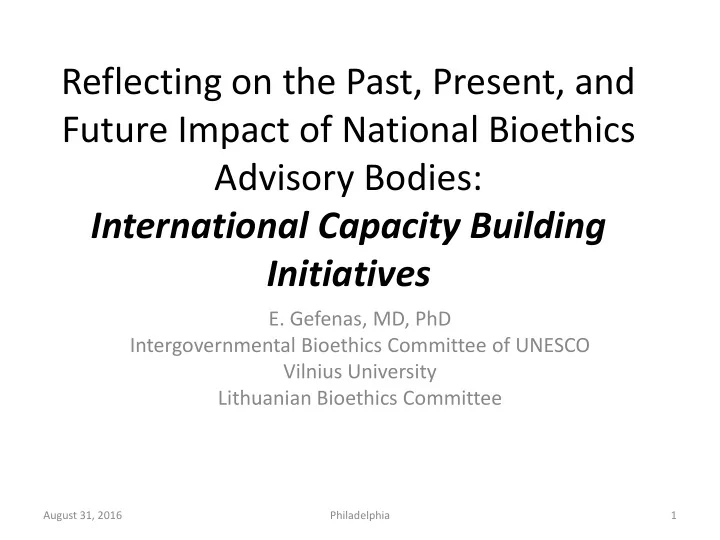

Reflecting on the Past, Present, and Future Impact of National Bioethics Advisory Bodies: International Capacity Building Initiatives E. Gefenas, MD, PhD Intergovernmental Bioethics Committee of UNESCO Vilnius University Lithuanian Bioethics Committee August 31, 2016 Philadelphia 1
Structure of the presentation I. UNESCO and international capacity building of national ethics committees (NECs) II. Two levels of capacity building Establishing/training of new NECs – ABC project Facilitating the activities of existing NECs: General IBC/IGBC/COMEST activities Other initiatives – Global Summit III. Challenges to NECs August 31, 2016 Philadelphia 2
International bodies for capacity building of NECs • European initiatives – NEC Forum sponsored by the European Commission, which meets on a yearly basis – 28 MS of the EU – European Conference of National Ethics Committees (COMETH) sponsored by the Council of Europe • UNESCO is involved in: – Global Summit of National Bioethics Advisory Bodies , meeting on a biannual basis supported by a secretariat at the World Health Organisation – Assisting Bioethics Committees (ABC) Project August 31, 2016 Philadelphia 3
UNESCO Universal Declaration on Bioethics and Human Rights, Article 19 • “Independent, multidisciplinary and pluralist ethics committees should be established, promoted and supported at the appropriate level in order to: – Assess the relevant ethical, legal, scientific and social issues related to research projects involving human beings; – Provide advice on ethical problems in clinical settings; – Assess scientific and technological developments, formulate recommendations and contribute to the preparation of guidelines on issues within the scope of this Declaration; – Foster debate, education and public awareness of, and engagement in bioethics.” August 31, 2016 Philadelphia 4
UNESCO Assisting Bioethics Committees (ABC) Project • Directly follows from the Universal Declaration on Bioethics and Human Rights • In the majority of member states NECs do not exist Three phases of the ABC project : • 1. Exploration and assessment of the existing bioethics infrastructure in Member States; • 2. Technical support for the establishment of the national bioethics committee; • 3. Technical support for long-term sustainability: a. Technical capacity-building trainings (3 trainings in 3 years); b. Partnerships, internships and networking; c. Provision of practical information. August 31, 2016 Philadelphia 5
Committees established in the following Member States • According to http://unesdoc.unesco.org/images/0015/001528/152825e.pdf • Colombia (2009), Côte d'Ivoire (2002), El Salvador (2009), Gabon (2008), • Ghana (2009), Guinea (2007), Jamaica (2009), Kenya (2008), • Madagascar (2007), Mali (2009), Oman (2009), Togo (2007) • However, no further information about the activities is provided August 31, 2016 Philadelphia 6
Intergovernmental Bioethics Committee (IGBC) • Created in 1998, under Article 11 of the Statutes of the International Bioethics Committee (IBC). • Comprised of 36 Member States whose representatives meet at least once every two years to examine the advice and recommendations of the IBC. August 31, 2016 Philadelphia 7
The International Bioethics Committee (IBC) • 36 independent experts that follow progress in the life sciences and its applications in order to ensure respect for human dignity and freedom, created in 1993. • Main tasks: – reflection – exchange of ideas and information – heightening awareness – co-operation with the international governmental and non-governmental organizations – dissemination of the principles set out in the UNESCO Declarations August 31, 2016 Philadelphia 8
Topics Reports of the IBC: • The Principle of the Sharing of Benefits (2015) • Updating Its Reflection on the Human Genome and Human Rights (2015) • The Principle of Non-Discrimination and Non-Stigmatization (2014) • Traditional Medicine Systems and their Ethical Implications (2013) • The Principle of Respect for Human Vulnerability and Personal Integrity (2013) • Report of the IBC on social responsibility and health (2010) • Report of IBC on Human Cloning and International Governance (2009) • Report of IBC on Consent (2008) Preliminary Work Programme for 2016-2017 – big data in health care and health research – bioethical questions arising from conditions of refugees and migrants, with a specific focus on health care August 31, 2016 Philadelphia 9
NECs in Europe • Main functions are very similar all over Europe – Opinions/recommendations on bioethical issues – Facilitation of public debate – Participation in the legislative actions • However, review of human research projects is a rather common function of NECs in the New Member States of the EU (members from 2004): – Most of the biomedical research - Slovenia – Multicenter studies – Lithuania – Specific projects – e.g., human genome in Latvia – Appeal body – Poland 2008.09.14 Astana, 2016 10
Challenges to NECs: developed countries • Misinterpretation of NECs activities difficult to measure impact recommendations cannot be directly implemented cannot offer definitive solutions to problems • Future challenges improving NECs ways and possibilities to reach out to the public addressing new developments regarding emerging technologies August 31, 2016 Philadelphia 11
Challenges to NECs: developing countries I • The main remaining challenge is how to overcome the “asymmetry” between developing and developed countries in terms of: – Availability of information on structure/functioning/output – Limited resources – Difficulties to engage in a pluralistic discourse in the authoritarian/undemocratic societies August 31, 2016 Philadelphia 12
Challenges to NECs: developing countries II • Issues to be prioritized and understanding of what is an “ethical issue” are context specific: – E.g., in many developing countries the problem of corruption rather than ethical issues of emerging technologies can be seen as a priority issue • Controversies of global approaches: – Developed countries are less interested in a general framework of principles, while developing countries usually lack resources/means to implement them August 31, 2016 Philadelphia 13
Concluding remarks • Global capacity building initiatives should be more explicit about different challenges faced by the NECs operating in different socio- cultural contexts • Experience of establishing/building NECs in the EU/Council of Europe member states can be used to better understand processes in the developing countries August 31, 2016 Philadelphia 14
Recommend
More recommend